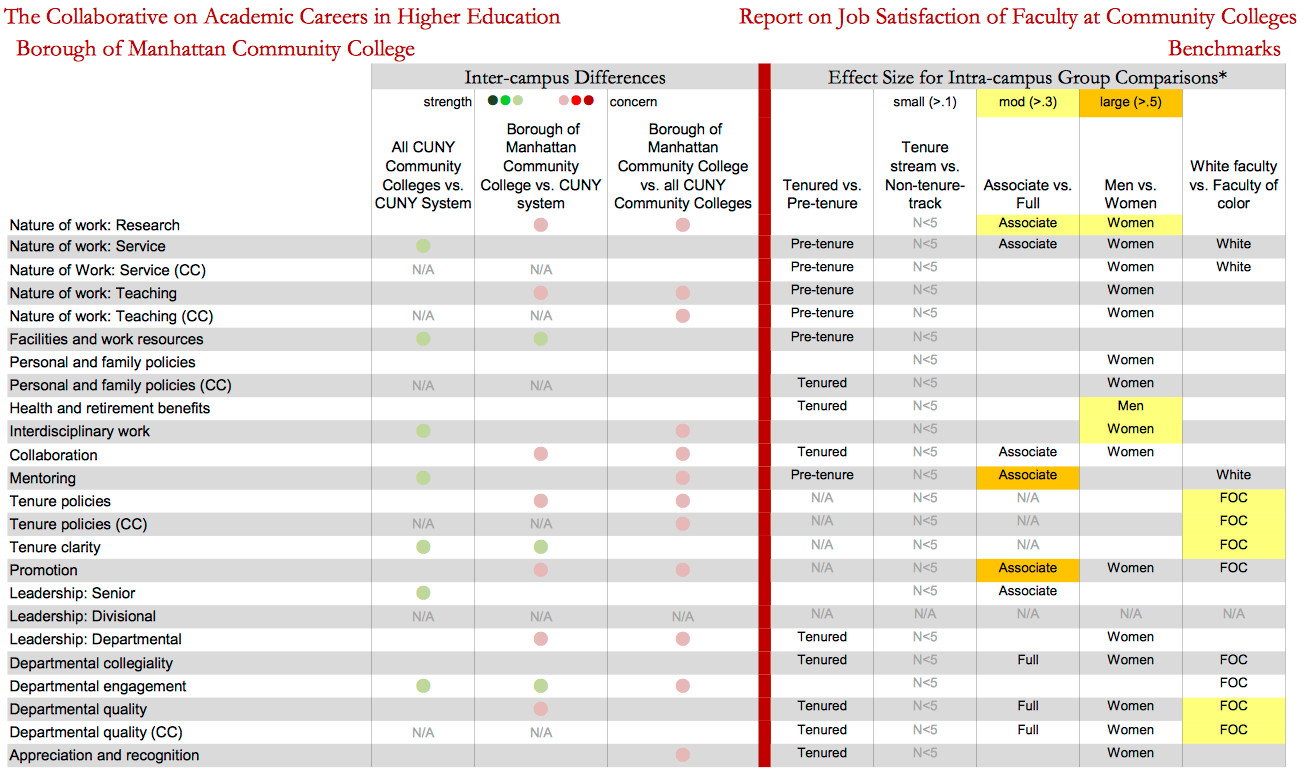In Spring 2019, BMCC and CUNY administered the COACHE Faculty Job Satisfaction Survey for the second time. (The survey was first sent out in 2015. See below.) This site collects the survey results for BMCC and the college’s response to the information it received.
2019 Survey
The Report on the 2019 survey is available below. This report has the aggregated responses on all standard COACHE items.
Here are some highlights: Faculty response rates were higher this year than in 2015, with 52% of the faculty surveyed responding.
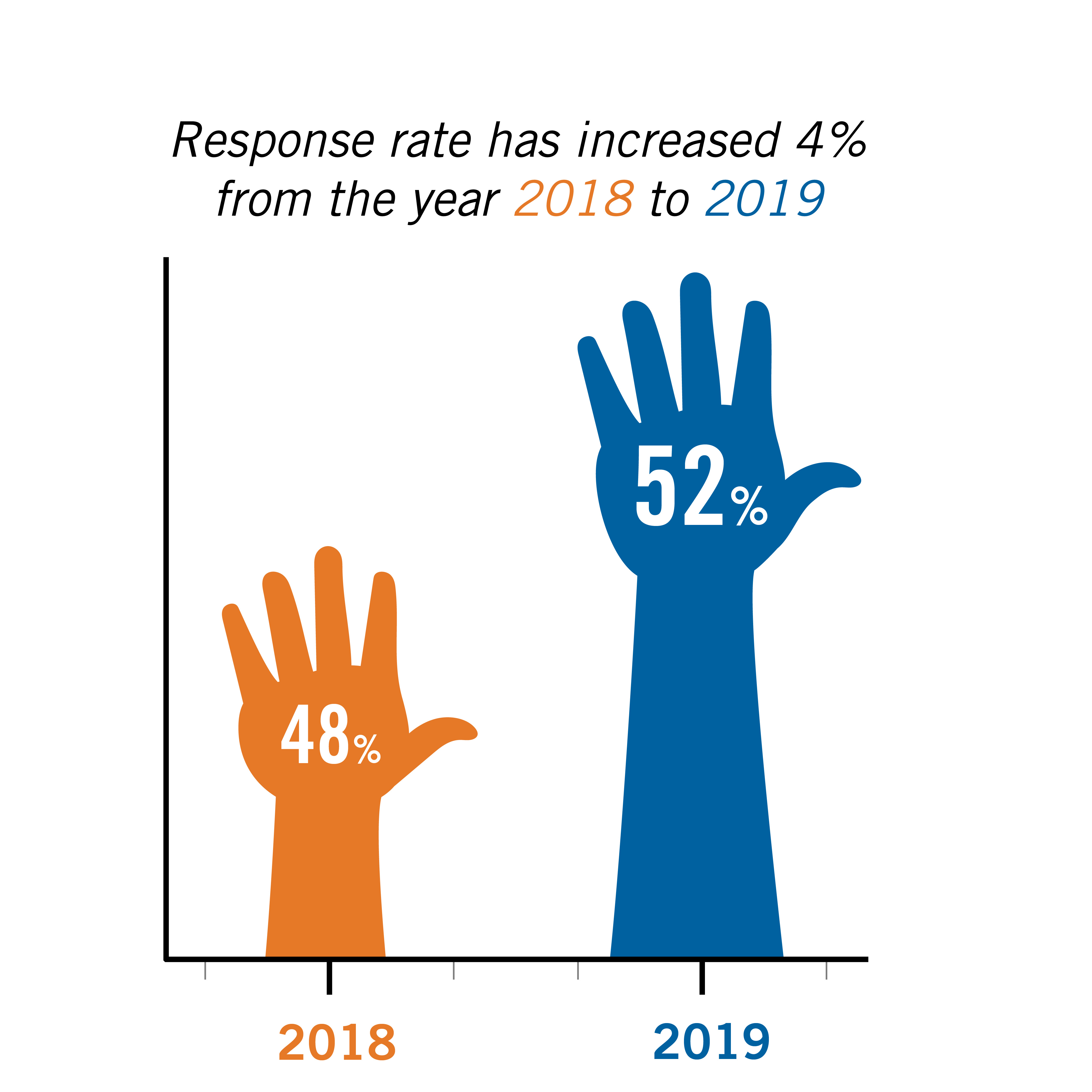
The survey asks faculty to identify the top two (and only 2) best and worst aspects of working at BMCC. The top four in each category are shown below.
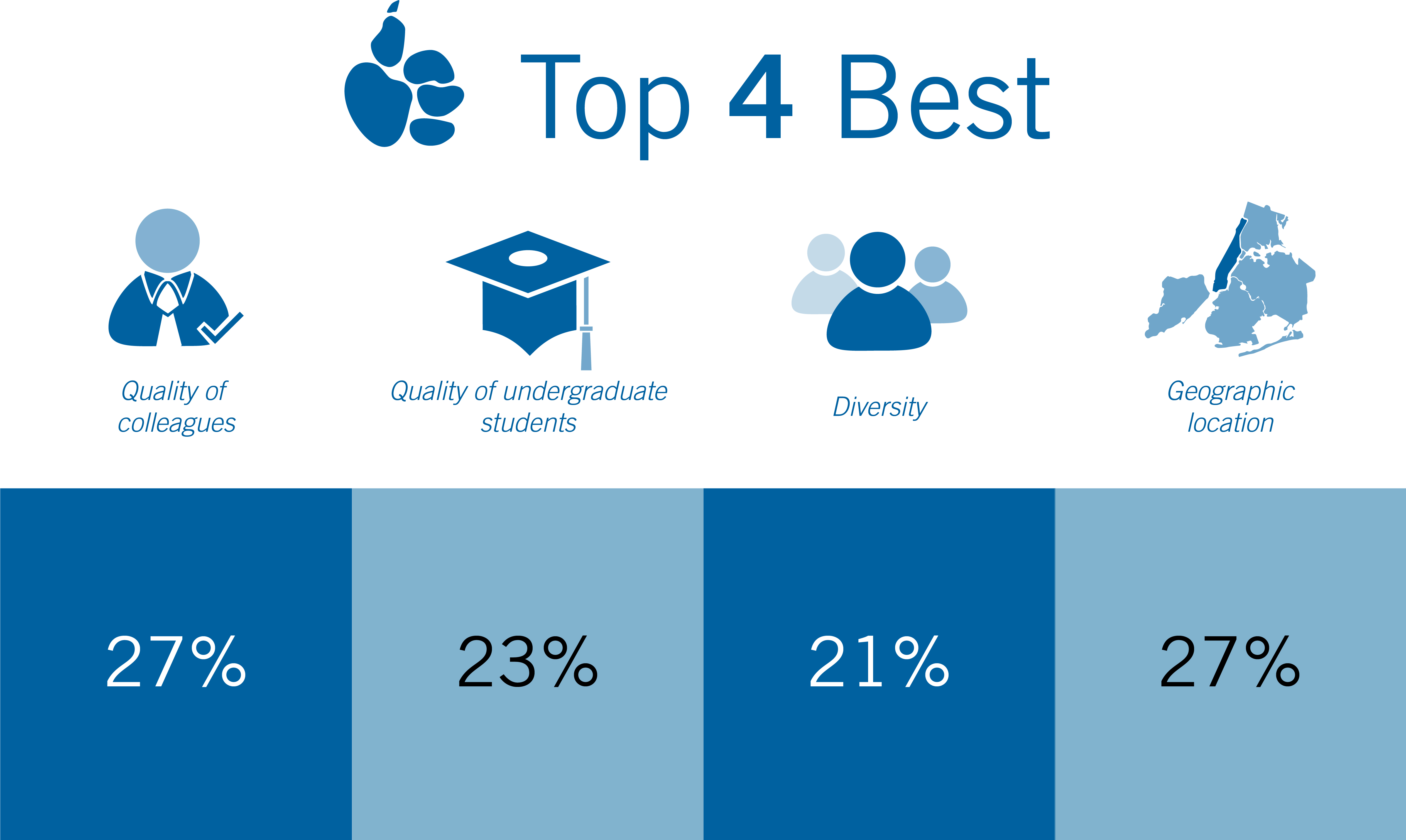
Three of the four best aspects are the same as in 2015 (quality of colleagues, geographic location, and diversity). “Quality of undergraduates” joins the other for the top four best aspects of working at BMCC.
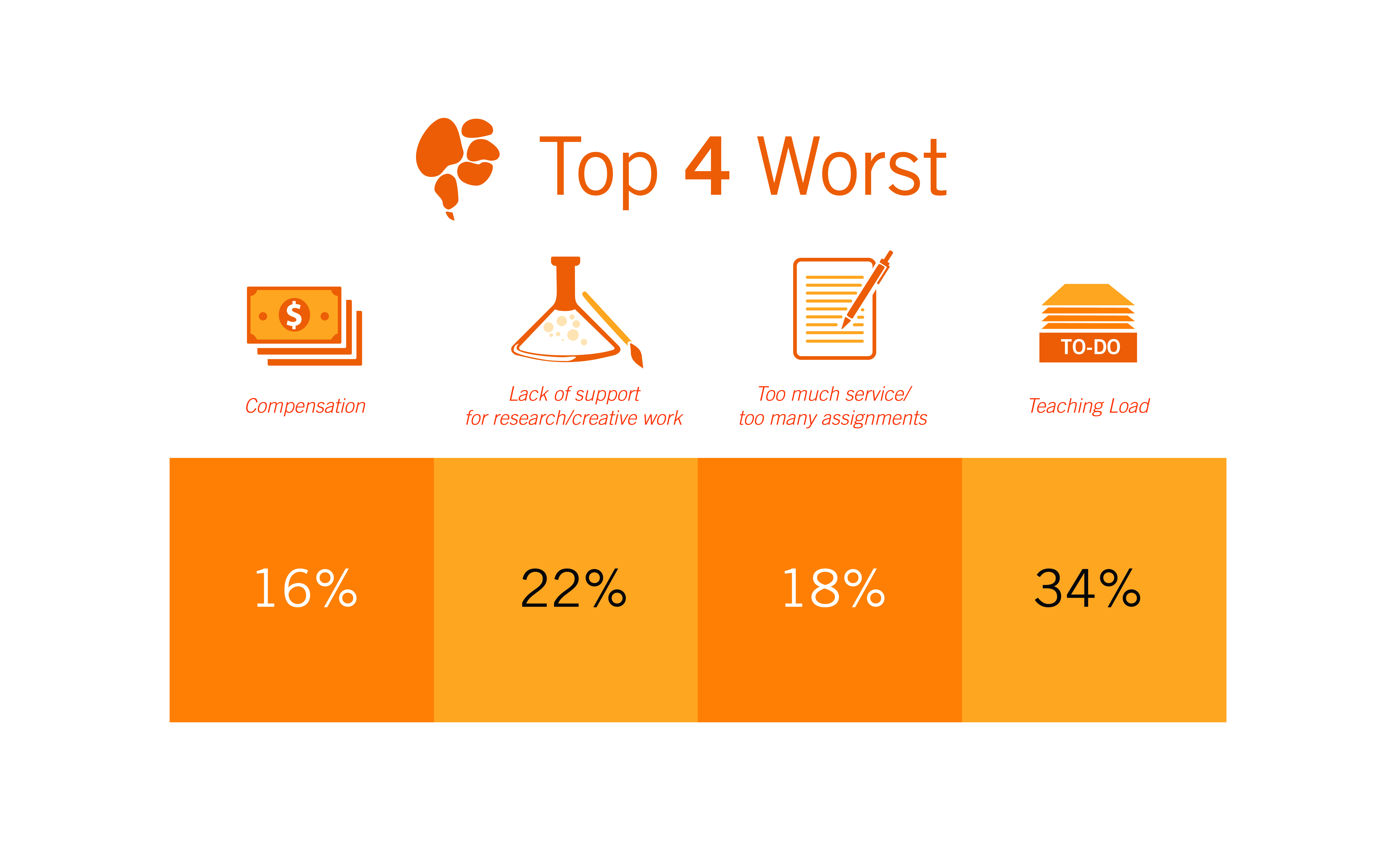
The four leading responses about the worst aspects of working at BMCC are all the same as they were in 2015: teaching load, lack of support for research/creative work, too much service / too many assignments, and compensation.
Report Benchmarks
The survey report gathers questions into thematic areas and benchmarks the BMCC scores against two groups of colleges: five large urban community colleges in CUNY and SUNY, and the entire community college cohort that has administered the survey (mostly CUNY and SUNY colleges).
This is the chart showing our benchmark scores across research, service, and teaching, for example.

This is the key to understanding the benchmark charts.
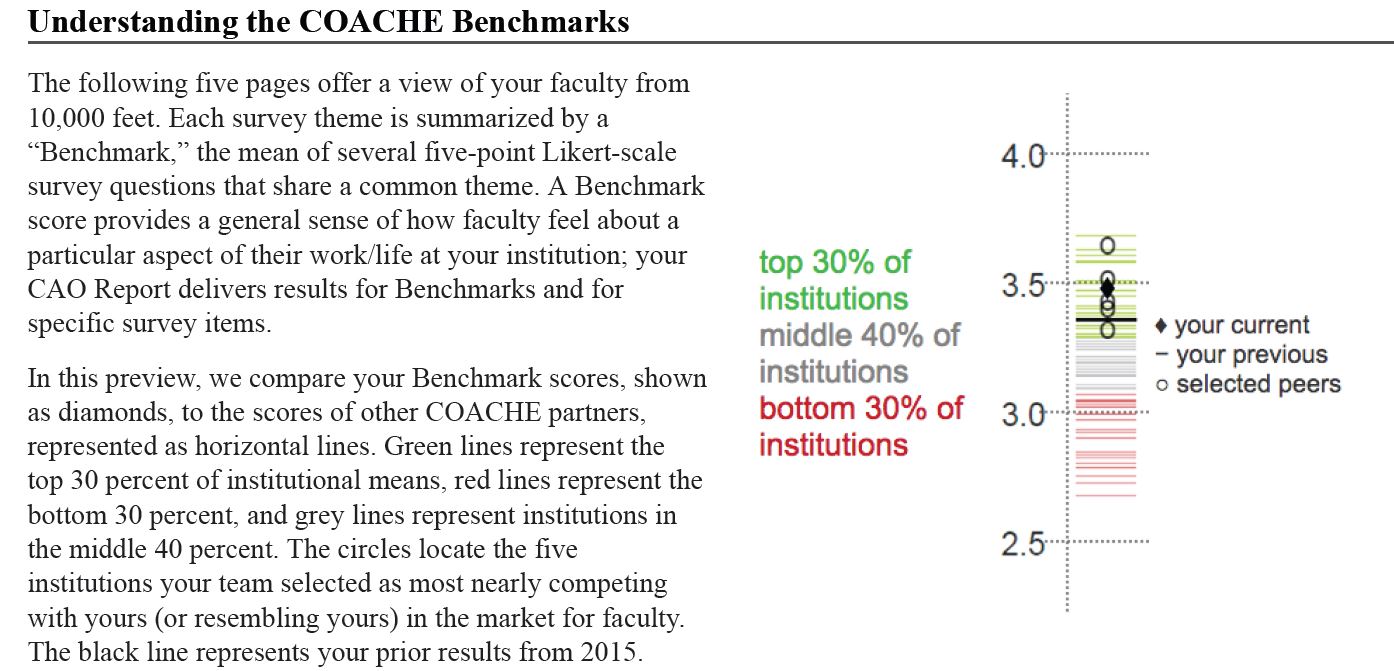
The Preview Report does not include responses to the campus-specific questions that the college added to the survey. Those responses will be compiled by the Office of Institutional Effectiveness and Analytics. The BMCC questions were developed by the Steering Committee in Fall 2018. (See below for Steering Committee membership.)
The results of the entire survey will be analyzed by the Steering Committee, which will identify areas for further study and recommend actions to the college president. The results of the survey will also be integrated into the college’s strategic planning process. (More information on the strategic plan process, Designing for Success, can be found here.)
COACHE Steering Committee, 2018-2020:
Co-chairs
Eda Henao, Modern Languages
Christopher Shults, Dean, Institutional Effectiveness and Strategic Planning
Jim Berg, Associate Dean of Faculty
Hollis Glaser, Speech, Communication, and Theater Arts
Kenneth Levinson, Academic Literacy and Linguistics
Catarina Mata, Science
Kathleen Offenholley, Math (PSC)
Claire Wladis, Math
Tuvi Voorhees, Academic Literacy and Linguistics
Greer McPhaden, Director, Faculty Appointments
Siddharth Ramakrishnan, Director, Research
Odelia Levy, Chief Diversity Officer
For more information on the survey, contact Associate Dean Jim Berg.
Results of the 2015 Survey
The overall survey report, called the Provost’s Report and posted below, reports the survey results and compares BMCC responses to those at other CUNY community colleges and with CUNY overall. The best things about working at BMCC are its diversity and geographic location, with the quality and support of colleagues also rating highly. The most often cited negative is the teaching load (cited by 45% of respondents), followed by the limited support for research and compensation. (The survey was conducted while the faculty were working without a contract. Since then, the contract was settled and a teaching load reduction was negotiated. The teaching load reduction is being phased in and will be felt in full at BMCC in 2019-20).
The table below shows the benchmarks, and how BMCC scored. A red dot means it’s an area of concern for the college. The yellow and orange bars show significant differences in responses for some segments of the faculty population.
In November 2015, then Provost Karrin Wilks convened a task force to review the results of the job satisfaction survey. As she engaged faculty in analyzing the survey results in an email to the campus:
“Based on our initial analysis of the survey results, we will establish working groups to focus on three key areas: support for research, support for interdisciplinary activity, and governance. We are looking for volunteers to work primarily in February to clarify issues and draft recommendations for improvement in each of these areas.”
Each of the three groups researched the issues and interviewed or surveyed more faculty. The reports from each group are posted below.
- Provosts Report
- Follow up reports
In response to the survey, some of the actions taken by the college include,
- Establishing a Research Advisory Committee with representation from each department, to advise the Office of Faculty Affairs;
- Creating an RFP to incentivize cross-disciplinary activity, through the Office of Faculty Affairs;
- And establishing a faculty-administration task force to review the college’s Governance Plan and make any recommendations for changes.
- Reorganizing support for teaching and research under the Associate Dean for Faculty (Jim Berg).
- Establishing with the Academic Senate the Distinguished Teaching Award to recognize excellence and innovation in teaching.
In addition, the Office of Faculty Affairs has improved its communication with faculty through a new web site and blog, and has piloted a networked mentoring project to increase the availability of mentors for new and tenure-track faculty outside of their home departments.
About COACHE
The Collaborative on Academic Careers in Higher Education (COACHE) at the Harvard Graduate School of Education is a research-practice partnership and network of peer institutions dedicated to improving outcomes in faculty recruitment, development, and retention. Under COACHE, more than 250 colleges, universities, and state systems have strengthened their capacity to identify the drivers of faculty success and implement informed changes.
Through over a decade of work with senior faculty administrators, COACHE has a unique understanding of faculty needs and the intricacies of life in the collegiate environment. Based on scholarly literature, interviews with faculty, and focus groups with senior academic administrators, the COACHE Faculty Job Satisfaction Survey was crafted by and for academic affairs individuals.
More information about COACHE and the Faculty Job Satisfaction Survey

